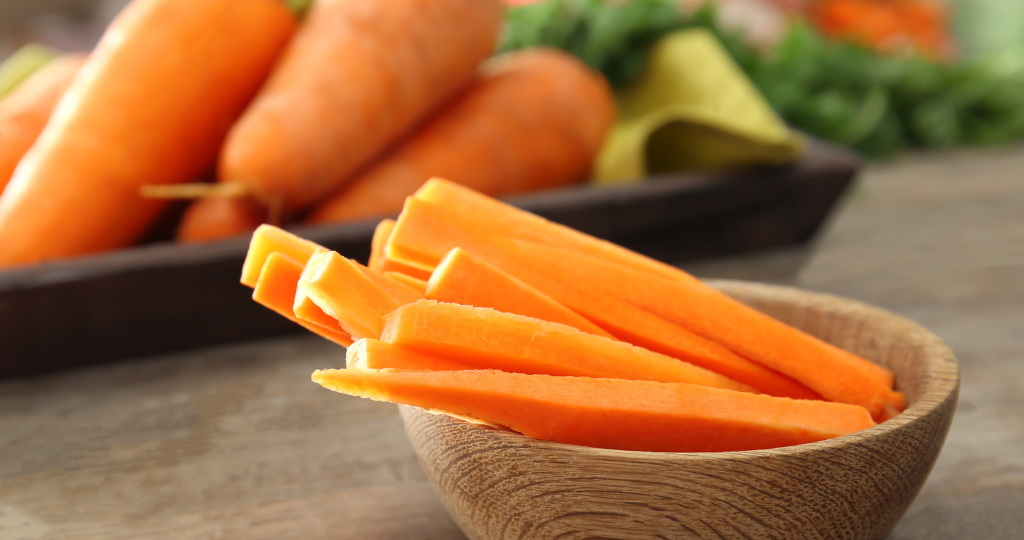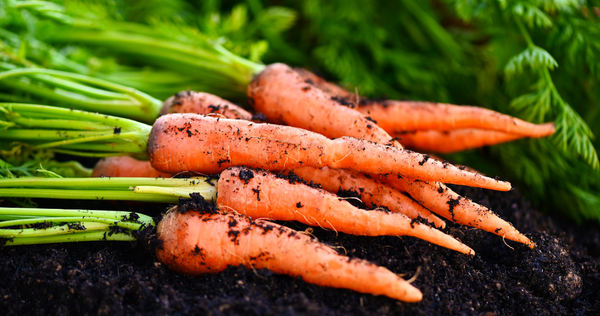
Carrot Juice vs Raw Carrots: Which is Healthier?
Carrot juice is very popular as a healthy drink. But is making juice out of carrots really better than eating raw carrots? Let's find out.
Juices seem full of goodness because vegetables get crushed into liquid. However, important nutrients may actually be reduced when making juice.
We compare carrot juice and raw carrots. See what happens from farm to glass. Understand differences in vitamins, minerals, fibres and calories. Also, check the benefits of each for immunity, weight loss, digestion, etc. This helps us clearly know if drinking carrot juice is more nutritious than chomping whole carrots!
The surprise judgment will help settle the debate once and for all - should you drink carrot juice daily or stick to munching on crunchy orange veggies? Let's uncover the truth through a fair comparison of all factors.
What's inside carrot juice and raw carrots
Drinking carrot juice seems full of vitamins since it's made by squeezing carrots into liquid. But raw carrots keep more key nutrients inside them that get lost when preparing for juice.
Carrot juice nutrition
- Carrot juice contains lots of vitamin A. This vitamin benefits eye health and immunity.
- It also has vitamin C to fight infections, along with antioxidants that remove harmful free radicals from the body.
- However, the insoluble fibre gets filtered out, so carrot juice lacks gut-healthy fibre and may cause digestive issues in some folks.
Raw carrot nutrition
- Whole carrots retain way more fibre, which is essential for good digestion and bowel movements.
- They also provide vital minerals like calcium for bones, magnesium for heart health, and phosphorus for cell repair.
- Additionally, raw carrots have a wider array of B-complex vitamins related to energy release, enzyme production, brain function, etc.

So clearly, eating whole carrots gives our body more micronutrients, antioxidant compounds, as well as insoluble and soluble fibres compared to only drinking carrot juice. The making of juice process causes nutrient losses. The natural fibre matrix in raw carrots has huge benefits for the heart, gut, immunity, brain and metabolic health that carrot juice alone cannot match.
Potential health benefits
Both carrot juice and raw carrots provide significant health advantages through their nutritional makeup:
Carrot juice benefits
- Immunity booster: The vitamin C and antioxidants in carrot juice boost immunity by enhancing the disease-fighting capacity of white blood cells and antibodies.
- Vision support: High levels of pro-vitamin A carotenoids get converted to retinol to protect eyesight and stall age-related vision decline.
- Anti-inflammatory: Compounds like anthocyanins have antioxidant and anti-inflammatory activities to ease swelling, pain and irritation in arthritis, injuries etc.
- Anaemia management: Carrot juice provides iron to raise haemoglobin levels while vitamins C, B12 and copper improve iron absorption in combating anaemia.
- Skin health: The carotenoids safeguard skin cells from sun damage and free radicals. Vitamins C and E boost collagen production to keep skin firm and youthful.
- Cancer prevention: The substance present in it exhibits anti-cancer actions against leukaemia, colon, bladder and breast cancer cells, as per research.
- Heart health: Potassium lowers blood pressure while antioxidants remove plaque deposits, making carrot juice beneficial for cardiac health.
- Stronger immunity: Carrot juice boosts the body's resistance to harmful pathogens and viruses, reducing the risk of recurrent infections and related inflammation.
- Bone strength: Vitamin K1 present builds stronger bones by improving calcium absorption and supporting the production of osteocalcin protein.
Raw carrot benefits
- Regulates blood sugar: Carrots contain carotenoids that balance insulin and blood sugar. The fibre slows sugar absorption, preventing glucose spikes.
- Lowers cholesterol: Soluble fibre binds bile acids and expels cholesterol from the body. This keeps total cholesterol at healthy levels.
- Detoxification: Carrots enhance liver function, aiding the detoxification of heavy metals, etc. The fibre also removes toxins from the gastrointestinal tract, preventing reabsorption.
- Gut and bowel health: Both insoluble and soluble fibres in carrots relieve constipation while feeding good gut bacteria through prebiotics. This ensures smooth digestion.
- Younger-looking skin: Carrots provide vitamin C for collagen formation and vitamin E that locks moisture, minimising wrinkles and dryness. The antioxidants protect the skin from UV damage.
- Injury healing: Vitamins A, C, K, and B complex speed up recovery from wounds or trauma by increasing collagen cross-linking and new tissue formation.
- Reduces inflammation: The anti-inflammatory nutrients in carrots can relieve inflammatory conditions like arthritis, gout and autoimmune disorders.
- Prevents neural tube defects: Carrots supply vitamin A, which is linked to a significantly lower incidence of devastating birth anomalies.
- Oral health: Chewing crunchy raw carrots clears plaque and food particles, lowering bacterial accumulation, and preventing tooth decay, gum disease and bad breath.

Calories and weight loss
A key consideration is how these options impact total calorie consumption and weight goals:
Carrot juice's effects on weight loss
Drinking carrot juice is a healthy habit, but it may not help much with losing weight. Here's why:
- A standard cup serving of carrot juice packs nearly 100 calories, over double the amount in an equivalent serving of solid, raw carrots.
- Making carrot juice removes all the insoluble and soluble fibre present in whole carrots and lends a filling effect in the stomach for a few hours after eating. The lack of fibre makes carrot juice less satiating.
- The natural fruit sugars in carrot juice cause a rapid spike in blood glucose levels, which triggers the pancreas to secrete more insulin, resulting in quicker fat storage return of hunger pangs.
Raw carrot's effects on weight loss
Munching on crispy raw carrots makes for a smarter snack choice for those aiming to shed extra pounds. Some key aspects:
- Carrots are very low in calories by volume due to their high water content. One cup provides just 45 calories, making it a dieter's dream food.
- The natural fibre matrix in raw carrots comprises insoluble and soluble fibres like cellulose, pectin, etc. This helps delay stomach emptying, keeping a person fuller for longer durations between meals and aiding weight loss.
- Uncooked carrots require substantial chewing, releasing sugars slowly into the bloodstream, preventing drastic energy spikes and crashes, which encourages bingeing later. The longer satiation signals get transmitted to the brain.
Raw carrots are lower in calories, and their fibre content keeps hunger satiated for longer compared to juice. This makes them a better choice for managing weight.
Concerns and considerations
Pressing whole vegetables into juice may seem intuitively healthy. But there are downsides to consider regarding carrot juice:
- Fiber is lost in carrot juice. This causes a swift blood sugar spike. So, energy crashes can happen after the initial rush.
- Juices increase oxalates, which are bad for the kidneys. Whole carrots are safer.
- The body finds carrot juice harder to digest compared to chewing solid carrots. This stresses the digestive system.
- Juices get absorbed really fast. This gives a sudden energy burst, but it drops fast too. Solids like carrots release energy slowly and steadily.
- Carrot juice spoils quicker than whole crunchy carrots that last longer in storage.
- Adding greens to carrot juice to make it healthy actually makes the taste more bitter. This makes the juice less tasty.
On the other hand, raw carrots pose no specific concerns for most people. Their crisp crunch makes them more satisfying to eat, too.

Conclusion
While both whole carrots and carrot juice provide a spectrum of health benefits, raw carrots deliver better overall nutritional value. They conserve a wide array of key micronutrients, vitamin complexes, antioxidants, anti-inflammatory plant compounds as well as electrolyte minerals. Their fibre content surpasses juice by promoting weight management, digestion, and heart and gut health simultaneously.
Carrot juice makes an occasional nourishing drink but isn't suitable as a daily carrot intake replacement. Blend other vegetables into juices, too, for diversity. Nothing beats biting into a fresh, homegrown carrot for a supercharged crunch!
Frequently asked question
1. Is carrot juice as nutritious as eating a whole carrot?
While carrot juice is rich in certain nutrients like vitamins A and C, it lacks the fibre found in whole carrots. The juicing process filters out insoluble fibre, making raw carrots a more balanced choice for overall nutrition, including gut health and digestion.
2. Can drinking carrot juice improve my skin health?
Yes, carrot juice can benefit your skin due to its high content of vitamins A and C, antioxidants, and carotenoids, which protect skin cells against damage and support collagen production. However, whole carrots also offer these benefits, along with fibre that aids in detoxification for clearer skin.
3. Will consuming raw carrots help with weight loss?
Yes, raw carrots can be an excellent addition to a weight-loss diet. They are low in calories and high in fibre, which can help you feel fuller for longer periods, reducing overall calorie intake. In contrast, carrot juice may provide more calories and less satiety due to the absence of fibre.
4. How does carrot juice affect blood sugar levels?
Carrot juice contains natural sugars and lacks the fibre found in whole carrots, which can lead to quicker spikes in blood sugar levels. In contrast, the fibre in raw carrots helps to slow down sugar absorption, offering a more stable energy release and aiding in blood sugar regulation.
5. Can I drink carrot juice daily?
While carrot juice can be part of a healthy diet, it's best consumed in moderation due to its high sugar content and lack of fibre compared to whole carrots. Including a variety of vegetables in your juicing routine and opting for whole carrots regularly can provide a more balanced nutrient intake.





